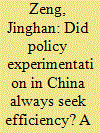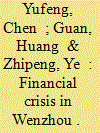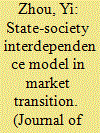|
|
|
Sort Order |
|
|
|
Items / Page
|
|
|
|
|
|
|
| Srl | Item |
| 1 |
ID:
137465


|
|
|
|
|
| Summary/Abstract |
Policy experimentation has been widely considered a ‘magic bullet’ of policy improvement and key to economic prosperity in China. This article, however, argues that policy experimentation in China does not always seek policy efficiency. Rather, it can be manipulated as a political symbol without actually affecting practices. By taking a case study on Wenzhou's financial reform, this article illustrates that local policy experimentation can serve as a mechanism for the central government to legitimately delay reform practices—in the case of Wenzhou's financial reform in 2012, out of a desire to maintain socio-economic stability during the power succession at the 18th Party Congress. In this reform, socio-economic stability was deemed more important than developing a sustainable and effective long-term policy. This article provides a new perspective on understanding policy experimentation in China by proposing the idea of ‘symbolic reforms’.
|
|
|
|
|
|
|
|
|
|
|
|
|
|
|
|
| 2 |
ID:
159564


|
|
|
|
|
| Summary/Abstract |
Few studies have focused on the evaluation of China's "four trillion yuan economic package" promulgated in 2008, especially its negative effects. This article seeks to verify a hypothesis that the financial crisis in Wenzhou between 2011 and 2014 was an unanticipated consequence of the "four trillion yuan economic package". By using the Austrian business cycle theory, the authors attempt to identify the causal mechanisms of the Wenzhou financial crisis. They obtained the following findings: First, the tremendous credit expansion accompanying the "four trillion yuan economic package" distorted interest rate signals and the production structure, eventually leading to the financial crisis in Wenzhou. Second, the industrial policy accompanying the "four trillion yuan economic package" and relations-based governance in Wenzhou strengthened the above causal effect at the national and regional levels. This article unravels the black box of the Wenzhou financial crisis and sheds light on the policy evaluation literature on massive government intervention in China.
|
|
|
|
|
|
|
|
|
|
|
|
|
|
|
|
| 3 |
ID:
120812


|
|
|
|
|
| Publication |
2013.
|
| Summary/Abstract |
It is argued in our paper that current studies of civil society in China, which place too much emphasis on its 'independence', are neither practical nor conducive to the sound development of China's civil society, because an adversarial intensification is likely to arise between the state and society. As is shown in our empirical study, despite the fundamental control imposed by the government, Wenzhou Business Association is actively involved in industry governance, constantly empowered by the government, and thus gradually achieves growth and development. This leads to a conclusion that it appears to be a rather more realistic developmental path for China's civil society for associations to make full use of the government's expanding space and to actively participate in public governance.
|
|
|
|
|
|
|
|
|
|
|
|
|
|
|
|
| 4 |
ID:
120817


|
|
|
|
|
| Publication |
2013.
|
| Summary/Abstract |
Based on first-hand field research data, this paper explores the construction of a 'Farmers' City' in Wenzhou in the early 1980s. It studies the actors, their relationships, and the institutions, and proposes a 'state-society interdependence model'. It concludes that the spontaneous, bottom-up urbanization process initiated by farmers as described in the texts was actually the win-win result of an interactive and interdependent relationship between the farmers and local government. The reasons are: (1) the actors, including the local government, the specialized farmers (zhuanye hu), and the other farmers, collectively owned, controlled, and obtained the resources; (2) in terms of the mobilization-response process, the close patron-client ties between the farmers and local government formed a strong interdependent relationship; and (3) in terms of the institutional reforms, the folk interests and demands were always a reference point for the local government. The farmers and their government were partners, participants, and practitioners in grassroots institutional reform.
|
|
|
|
|
|
|
|
|
|
|
|
|
|
|
|
|
|
|
|
|